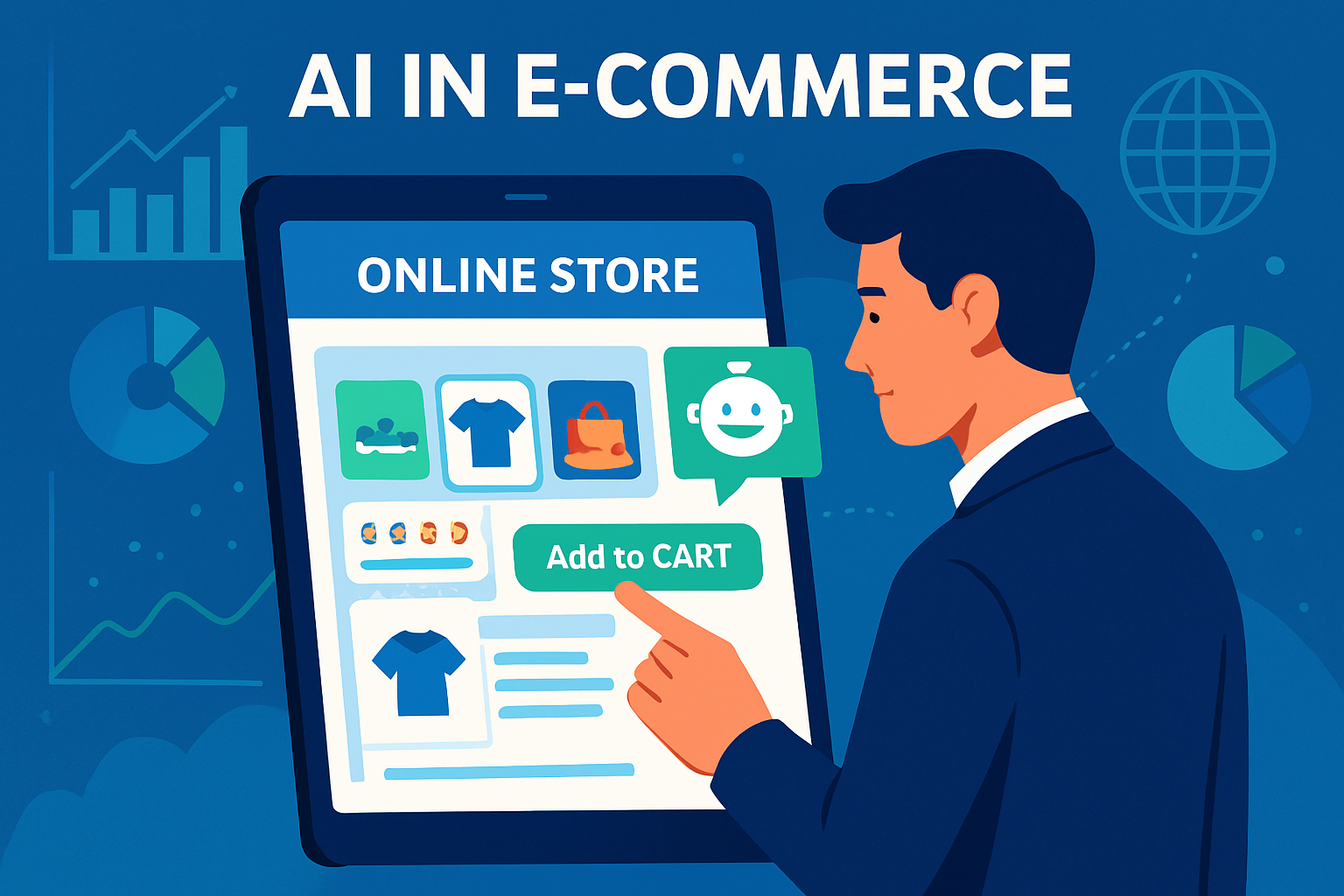
The Impact of AI on E-commerce: Personalization, Chatbots, and Predictive Analytics
Introduction: AI – The New Engine of Online Retail
Artificial Intelligence (AI) is no longer a futuristic concept in e-commerce; it’s a fundamental technology reshaping how online businesses operate and how consumers shop. From the moment a user lands on a website to long after a purchase is made, AI is working behind the scenes to personalize experiences, streamline operations, and drive sales. This article will explore the profound impact of AI on the e-commerce landscape, focusing on key areas like hyper-personalization, intelligent chatbots, predictive analytics for inventory and sales, and dynamic pricing. We will examine how these AI applications are enhancing customer journeys and providing businesses with a competitive edge, along with potential affiliate opportunities for relevant e-commerce AI tools and platforms.
AI-Driven Product Recommendations and Hyper-Personalization: Tailoring the Shopping Experience
One of the most visible impacts of AI in e-commerce is the ability to deliver highly personalized shopping experiences.
- Sophisticated Recommendation Engines: AI algorithms analyze vast amounts of data – including past purchase history, browsing behavior, viewed items, wish-listed products, demographic information, and even real-time interactions – to provide highly relevant product recommendations. This goes far beyond simple “customers who bought this also bought” suggestions.
- Personalized User Interfaces (UIs) and Content: Some platforms use AI to dynamically alter website layouts, product sorting, promotional offers, and even marketing email content to suit individual user preferences and behaviors.
- Benefits: Increased conversion rates, higher average order values, improved customer loyalty, and a more engaging shopping experience.
- Leading Platforms/Tools (Examples & Affiliate Opportunity): Many e-commerce platforms (Shopify, BigCommerce, Magento) offer built-in or app-based AI recommendation tools. Specialized AI personalization engines (e.g., Dynamic Yield, Optimizely, Clerk.io) also exist. (Affiliate links could point to these platforms, specific apps, or services that help businesses implement AI personalization.)
AI Chatbots for Customer Service: 24/7 Intelligent Support
AI-powered chatbots are revolutionizing customer service in e-commerce by providing instant, scalable, and increasingly sophisticated support.
- Instant Query Resolution: Chatbots can handle a large volume of common customer inquiries, such as order status, shipping information, return policies, and product details, freeing up human agents for more complex issues.
- Personalized Shopping Assistance: Advanced chatbots can act as virtual shopping assistants, guiding users through product discovery, asking clarifying questions, and even helping them complete purchases directly within the chat interface.
- Proactive Engagement: Chatbots can proactively engage website visitors, offering assistance or targeted promotions based on their browsing behavior.
- Data Collection and Insights: Interactions with chatbots provide valuable data on customer pain points, frequently asked questions, and product interest, which can inform business decisions.
- Leading Chatbot Platforms (Examples & Affiliate Opportunity): Platforms like Intercom, Drift, Tidio, or ManyChat offer AI-powered chatbot solutions for e-commerce. (Affiliate programs are common for SaaS chatbot providers.)
AI in Inventory Management and Supply Chain Optimization
Efficient inventory management is crucial for e-commerce success. AI helps businesses optimize stock levels and streamline their supply chains.
- Demand Forecasting: AI algorithms analyze historical sales data, market trends, seasonality, promotional impacts, and even external factors (like weather or economic indicators) to predict future product demand with greater accuracy.
- Automated Inventory Replenishment: Based on demand forecasts, AI can trigger automated reordering processes, ensuring popular items are in stock while minimizing overstocking of slow-moving products.
- Warehouse Optimization: AI can optimize warehouse layouts, picking routes for order fulfillment, and even manage robotic systems for sorting and moving inventory.
Predictive Analytics for Sales Forecasting and Trend Identification
Beyond inventory, AI-driven predictive analytics provide e-commerce businesses with valuable foresight.
- Sales Forecasting: More accurate sales forecasts help with financial planning, resource allocation, and marketing budget decisions.
- Identifying Emerging Trends: AI can analyze social media, search data, and industry news to identify emerging product trends or shifts in consumer preferences, allowing businesses to adapt quickly.
- Customer Segmentation and Lifetime Value (CLV) Prediction: AI can segment customers based on their behavior and predict their future lifetime value, enabling businesses to tailor marketing efforts and retention strategies.
AI for Dynamic Pricing Strategies in Real-Time
Dynamic pricing, where prices are adjusted in real-time based on various factors, is another area where AI is making an impact.
- Competitive Pricing: AI can monitor competitor prices and automatically adjust a business’s own prices to remain competitive.
- Demand-Based Pricing: Prices can be adjusted based on current demand levels, inventory availability, and even individual customer willingness to pay (though this requires careful ethical consideration).
- Personalized Discounts and Promotions: AI can determine the optimal discount to offer a specific customer to maximize the likelihood of conversion without unnecessarily eroding margins.
Ethical Considerations in E-commerce AI
While AI offers immense benefits, its use in e-commerce also raises ethical questions:
- Data Privacy: The collection and use of vast amounts of customer data for personalization require robust privacy policies and transparent practices.
- Algorithmic Bias: AI models can inadvertently perpetuate biases present in historical data, leading to unfair treatment or discriminatory recommendations for certain customer groups.
- Transparency and Explainability: Customers may want to understand why certain products are recommended or why prices change.
- Potential for Manipulation: The power of AI personalization could be used unethically to manipulate consumer behavior.
Conclusion: AI as an Indispensable Partner for E-commerce Growth
Artificial Intelligence is no longer a luxury but a necessity for e-commerce businesses looking to thrive in a competitive digital marketplace. From creating deeply personalized shopping experiences and providing instant customer support to optimizing back-end operations like inventory and pricing, AI offers a powerful suite of tools to enhance efficiency, boost sales, and build stronger customer relationships. As AI technology continues to evolve, its integration into every facet of e-commerce will only deepen, making it an indispensable partner for growth and innovation in online retail. Businesses that strategically leverage AI while upholding ethical standards will be best positioned for future success.

Leave a Reply